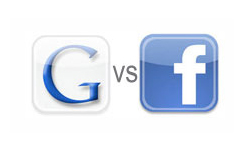Google vs. Facebook
There’s a requisite chaos to the “hacker culture” that has been central to the rise of both Google and Facebook: cobble something together, fueled by Red Bull and pizza, until it works; keep changing it and improving it, lest a competitor jump in and create something better; and if for some reason it doesn’t work, just do away with it altogether. From both the inside and the outside, it can look quite messy.
Take, for example, the fact that Google has been known to tweak its search algorithm hundreds of times per year, or that the Facebook home page goes through major facelifts on a regular basis. This week, Google killed an experimental social-collaboration project called Wave that had been heavily hyped at launch; last month, Facebook’s “Gift Shop” feature got the ax. That slash-and-burn, change-the-system mentality that a Valley superstar like Google or Facebook projects to the outside world applies internally, too.
Increasingly, these relatively small shifts in product and strategy are spelling out something much bigger: the two companies are, after months of speculation and prediction, really starting to go after each other.
You could put it this way: Facebook dominates the social Web, and Google dominates everything else. Google wants to wrest a bit of control of social media from Facebook; Facebook plans to use the vast network of connections and communication channels it’s built to more or less conquer the rest of the world. It’s the case of a giant with a glaring Achilles heel versus a smaller, more nimble player with a finely-honed skill that can attack its competitor right where it hurts.
Google, as has been well-documented, has been attempting to get into the social-networking game for years now and keeps flopping: Wave, which was touted at its debut as a potential revolution in communication, was only the latest embarrassment. Google Buzz, which some speculated could render Twitter obsolete, was beset almost immediately by privacy concerns that were easy to fix technically but may have permanently damaged its image. Google Friend Connect and the OpenSocial app platform product came across as second-tier imitations of Facebook’s own developer initiatives. They were reactionary, not revolutionary.
Source by news.cnet.com

Posted by Joe Rudkin on August 6, 2010 at 10:10 am
Clash of the titans! It’s going to be very messy
Posted by cuthbert SanthoshBS on August 6, 2010 at 1:34 pm
face book is give more computation to google face book page rank is high compare to google